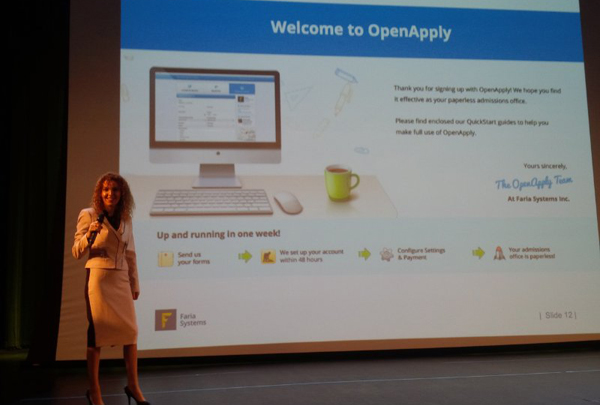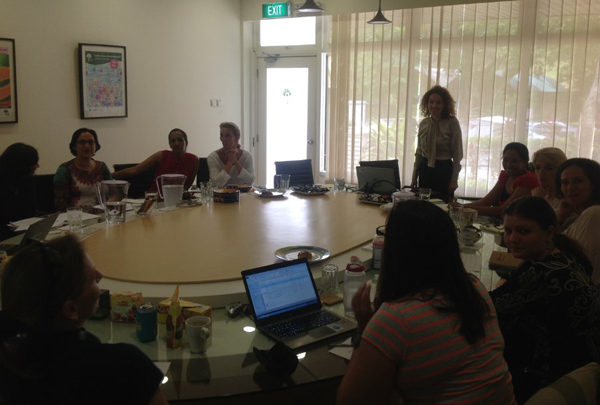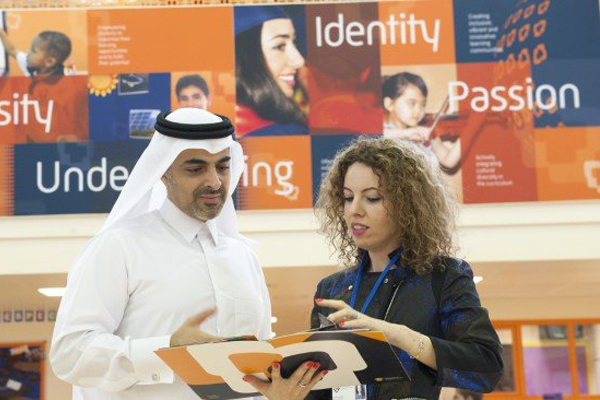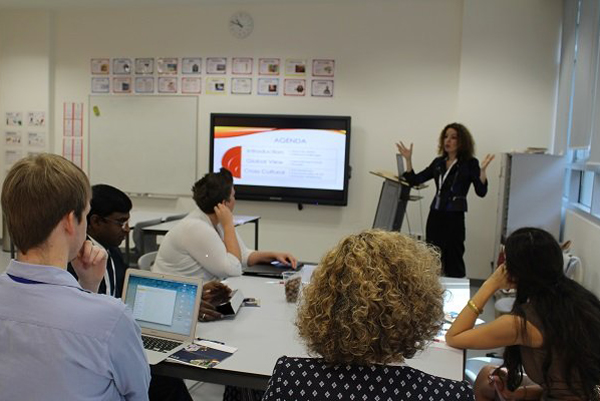.
Nivin’s Journey in an international magazine
The International Admissions Bulletin published Nivin’s Journey in an article, https://www.openapply.com/bulletin/mar-2017#p63
Why Admissions should sit at the Leadership Table? By Nivin El Aawar
The International Admissions Bulletin published Nivin’s article, https://www.openapply.com/bulletin/mar-2017#p32
Smart Techniques to Manage the Process
“Presented as an authority/knowledge expert in admissions and the education industry” Head of Education, GEMS World Academy Singapore
“Fantastic and very useful learning experience” Business Manager, North Jakarta Intercultural School
“Thank you for sharing good examples and experience” Assistant Director of Admissions, International School of Kuala Lumpur
“It was a pleasure to sit through your presentation, I look forward to learning more from your wealth of knowledge in the future” Head of Student, Parent Services and communications department, Xian Hi-Tech International School
“The overall presentation style was natural, sincere and well- delivered , you are a great ambassador for yourself and your organization” Head of Education, GEMS World Academy Singapore
My Philisophy in Family Coaching
My philosophy of family coaching is based on the creativity search for a path to happiness for each unique individual. Recognizing our inner core and identifying our emotional intelligence level to build any link to others core.
Achieving the happy outcome for a family is like building a pyramid with solid base of mutual understanding where all members contribute in putting the blocks of values, respect, awareness and positive attitude to create a balanced structure and top it with a flag of love and happiness.
Harmony among members needs awareness, awareness of self and the difference of the other to embrace each other’s uniqueness through the performance on the theatre of life.
Transparency in the approach, looking through objective lenses and practice attentive listening will develop our knowledge about other’s needs and enlighten our way forward to get along with them and compromise for the main family objective.
My vision of balanced family is by maintaining the balance of the members, in which the main three pillars “positive attitude, experience and knowledge” are compatible.
Positive Attitude:
EQ
Beliefs
Values
Talents
Concepts
Experience:
Skills build through years
Mistakes
Social exposure
Knowledge:
Education
Continous Learning
Critical thinking
Awareness
You cant have a rainbow without a little rain.
Happiness–it’s what we all strive to find and keep, even when it’s as elusive as ever. Nobody is jolly and elated all the time, but some individuals are definitely more fulfilled than others. Studies reveal that happiness has little to do with materialistic needs, goods, or wants, or high achievement; it boils down to your outlook on life, the quality of your relationships, and basic amenities like good governance and community resources. Check Step 1 and beyond for more tips and tricks on how to unlock the happier you.
12 Steps
1
Be optimistic. In the 1970s, researchers followed people who’d won the lottery and found that a year afterward, they were no happier than people who didn’t. This hedonic adaptation suggests that we each have a baseline level of happiness. No matter what happens, good or bad, the effect on our happiness is temporary, and we tend to revert to our baseline level. Some people have a higher baseline happiness level than others, and that is due in part to genetics, but it’s also largely influenced by how you think.
- Add up all the little joyful things that happen to you during the day. Write them down. For example, if there was no traffic on the road, if you had a very decent and scrumptious breakfast, if your friend said something uproariously humorous that made you laugh, if you took your dog out for a walk in the park and played with it, add these together. Your outlook will change.
- Feel deeply grateful for the things you have. This is a very effective way to be happy. If you feel grateful for the things you have, you not only become more happy but it also helps you to bring more into your life.
- View the glass as half-full instead of half-empty. Your girlfriend/ boyfriend broke up with you? Now you have the chance to meet someone else! You lost your job? Now you can seize the opportunity to find a better one! Adjust your mentality so that, in everything that happens to you, there’s some kernel of good.
- Put yourself in situations where fabulous, fortunate things are likely to happen to you. It’s easier to remain optimistic if you set yourself up for success. Cheating on a partner, or stealing someone’s bicycle — while temporarily thrilling — rarely end well for any party involved. Ask yourself before you act: Am I setting myself up for success or for failure?
- Think of your current situation (however hard it may be) and then think of how much harder some other people have it. Just be happy that you are not in that worse situation. Learn to enjoy your life!
2
Follow your gut. In one study, two groups of people were asked to pick a poster to take home. One group was asked to analyze their decision, weighing pros and cons, and the other group was told to listen to their gut. Two weeks later, the group that followed their gut was happier with their posters than the group that analyzed their decisions. Now, some of our decisions are more crucial than picking out posters, but by the time you’re poring over your choice, the options you’re weighing are probably very similar, and the difference will onlytemporarily affect your happiness.
- Next time you have a decision to make, and you’re down to two or three options, just pick the one that feels right, and go with it. Never regret the decisions you make, though. Just live by the 3 C’s of life: choices, chances, and changes. You need to make a choice to take a chance, or your life will never change.
3
Own yourself. This means accept and embrace your habits, your personality, mistakes, the way you talk, looks, your voice, and most importantly ‘You’. Try to be comfortable in your own skin and subconsciously communicate to others that, ‘This is me take it or leave it’. It means don’t apologize to anyone for something which is a part of you, like your personality, your voice, habits (good or bad), basically anything; remember there is always someone who likes you for the way you are. For example if you want to wear something which is weird but you find it cool, wear it, no one is stopping you. Its a deeper step towards building a good relationship with yourself.
4
Make enough money to meet basic needs — food, shelter, and clothing. In the US, that magic number is $60,000 a year. Any money beyond that will not necessarily make you happier. Remember the lottery winners mentioned earlier? Oodles of money didn’t make them happier. Once you make enough to support basic needs, your happiness is not significantly affected by how much money you make, but by your level of optimism.
- Your comfort may increase with your salary, but comfort isn’t what makes people happy. It makes people bored. That’s why it’s important topush beyond your comfort zone to fuel personal growth.
5
Treat your body like it deserves to be happy. It may sound cheesy to say, but your brain isn’t the only organ in your body that deserves to be happy. Researchers have found that exercise, healthy diets, and regular sleep are key factors in growing more happy and staying that way.
- People who are physically active have higher incidences of enthusiasm and excitement. Scientists hypothesize that exercise causes the brain to release chemicals called endorphins that elevate our mood.
- Eat right. Eating healthy foods — fruits and vegetables, lean meats and proteins, whole grains, nuts, and seeds — gives your body and brain the energy it needs to be healthy. Some scientists speculate that unhealthy diets, especially those rich in processed carbohydrates, sugars, and industrial vegetable fats, is responsible for brain shrinkage and certain brain diseases like depression and dementia
- Get enough sleep. Study after study confirms it: the more sleep you get, the happier you tend to be. Getting just a single extra hour of sleep per night makes the average person happier than making $60,000 more in annual income, astoundingly enough. So if you’re middle-aged, shoot to get at least eight hours of sleep per night; the young and elderly should shoot for 9 to 11 hours of sleep per night.
6
Stay close to friends and family: Or move to where they are, so you can see them more. We live in a mobile society, where people follow jobs around the country and sometimes around the world. We do this because we think salary increases make us happier, but in fact our relationships with friends and family have a far greater impact on happiness. So next time you think about relocating, consider that you’d need a salary increase of over $100,000 USD to compensate for the loss of happiness you’d have from moving away from friends and family.
- If relationships with family and friends are unhealthy or nonexistent, and you are bent on moving, choose a location where you’ll make about the same amount of money as everyone else; according to research, people feel more financially secure (and happier) when on similar financial footing as the people around them, regardless of what that footing is.
7
Be compassionate. Compassion is all about doing something kind for someone in need, or someone less privileged than yourself. A brain-imaging study (where scientists peek into people’s brains while they act or think) revealed that people gain as much happiness from watching others give to charity as they do receiving money themselves!
- Think of effective ways that you can make your community or the world a better place by being compassionate. Compassion is a key part of sustainable happiness:
- Tutor, volunteer, or get involved in a church group. Countless children are looking for someone to teach them and act as a role model.
- Make a microloan. A microloan is when you give someone (usually in the developing world) a very small sum of money for an economic project of their own. Many microloans have 95%+ repayment rates.
- Give a person in need food, clothing or shelter. It’s so basic we often forget to think about it, yet so easy to do.
- Increase the happiness of those around you by giving gifts. This will increase your happiness as well – in fact, the one giving the gift usually feels a larger pulse of dopamine (the neurotransmitter responsible for feeling happiness) than the person receiving the gift!
8
Have deep, meaningful conversations. A study by a psychologist at the University of Arizona has shown that spending less time participating in small talk and more time in deep, meaningful conversations can increase happiness. So next time you’re beating around the bush with a friend, instead cut right to the chase. You’ll be happier for it.
9
Find happiness in the job you have now: Many people expect the right job or career to dramatically change their level of happiness. But research makes it clear that your levels of optimism and quality of relationships eclipse the satisfaction gained from your job.
- If you have a positive outlook, you will make the best of any job; and if you have good relationships, you won’t depend on your job for a sense of meaning. You’ll find meaning in interactions with the people you care about. You’ll use your job as a crutch instead of relying on it for meaning.
- This is not to say you shouldn’t aspire to get a job that will make you happier; many people find that being on the right career path is a key determination in their overall happiness. It just means you should understand that the capacity of your job to make you happy is quite small when compared to your outlook and your relationships.
10
Smile: Science suggests that when you smile, whether you’re happy or not, your mood is elevated. So smile all the time if you can! Smiling is like a feedback loop: smiling reinforces happiness, just as happiness causes smiling. People who smile during painful procedures reported less pain than those who kept their facial features neutral.
11
Forgive: In a study of college students, an attitude of forgiveness contributed to better cardiovascular health. You could say forgiveness literally heals the heart. While it is unknown how forgiveness directly affects your heart, the study suggests that it may lower the perception of stress.
12
Make friends. In a 2010 study published by Harvard researchers in American Sociological Review, people who went to church regularly reported greater life satisfaction than those who didn’t. The critical factor was the quality of friendships made in church. Church-goers who lacked close friends there were no happier than people who never went to church. When researchers compared people who had the same number of close friends, those who had close friendsfrom church were more satisfied with their lives.
- The difference is the forming of friendships based on mutual interests and beliefs. So if church is not your thing, consider finding something else you’re deeply passionate about, making friends with those who share similar interests.
- When you interact with people who share your interests, you feel happier due to sensations of reward and well-being. This is because during such interactions, serotonin and dopamine — neurotransmitters responsible for feelings of happiness and relaxation — are released into the body. In other words, your body is designed to feel happier when engaged in social interactions.
Blending Coaching into Admission practices in International Schools
Nivin El Aawar, Head of Admission at the International School of London Qatar was invited in September to the German European School in Singapore (GESS) to provide workshops for the admission team and support staff as part on their professional development plan in terms of integrating customer care and coaching skills into the support team best practices.
Nivin holds an Executive Diploma in Human Resources Management from Cavendish College UK. With 15 years of diverse working experience in International and Multi-national companies between Lebanon, Abu Dhabi and Qatar. In addition, Nivin is a Certified Life Coach, Certified Family and Parental Coach and preparing for her Masters in Protocol and Soft Diplomacy.
Nivin developed the workshops in an action oriented set-up, in which the journey of the admission team from Admission practices then Public Relation and Marketing and ending it by Soft Skills, starting from the Inquiry until enrolment, involving other departments interaction through the different processes, the result of the presentations and brainstorming were all summarized in action plan by each member of the admission department highlighting current challenges and the action to be taken in elevating the admission department to a higher level, all the action plans were combined by the Admission Team Leader in a master plan to implement in the department development to move forward. Second step was demonstrating the admission role in selling the school and the marketing projection through maintaining good Public relation (PR), finalizing the sessions with soft skills/coaching skills and the wellbeing of the admission staff starting from self-awareness, Emotional Intelligence and thrive in new coaching skills to reach out to the total balance in the team, resulting in effectiency in the work place and increase of productivity, performance, better PR, customer orientation and professional development.
In the full day with the whole school support staff, Nivin developed workshops which satisfied all the different departments interests, under the main objective “Cross- Cultural Harmony Across Departments”, started with the big picture of the global view of international schools, the diversity impact in any international school and how as unique individuals can add value to the school community by improved communication skills. A projection on the leadership role and the emotional intelligence impact of the leadership style in international schools, in addition, referring different findings of market researches about Singapore, and interlinking the diverse community in Singapore to the international schools communities. Case studies about handling difficult communication challenges through different channels of communication skills and ending up with very informative self-reflection activities demonstrated with a lot of common challenges, high will for a change and great individual interaction.
Coaching is an essential component of an effective professional development program. Coaching can build will, skill, knowledge, and capacity because it can go where no other professional development has gone before: into the intellect, behaviors, practices, beliefs, values, and feelings of an individual.
You can reach Nivin through her email: nivinawar@hotmail.com
Globalization, Creativity, Merging Coaching into Admission office
Nivin El Aawar is the Head of Admissions and Marketing at International School of London in Qatar. She is a mother for two adorable daughters who attended International education since the beginning of their learning journey.
Nivin holds an Executive Diploma in Human Resources Management from Cavendish College UK. With 15 years of diverse working experience in International and Multi-national companies between Lebanon, Abu Dhabi and Qatar, Nivin held different roles in Human Resources and Management, such as Office Manager, Human Resource Director, Business Owner of Management Consultancy, General Manager of trading company, and business development for recruitment consultant.
In addition, Nivin is a certified Life Coach and one of the first group graduated in Qatar as a member of the International Coaching Federation, she is currently enrolled in Parental and Family Coaching program and she is also a member of the Professional Women Network in Qatar and other professional global organizations. Last year she attended 3 international conferences (The Alliance of International Education Qatar – ECIS April Leadership conference Berlin – International Admissions Conference in Zurich entitled The Multiple Intelligences of School Admissions). In February Nivin was invited to be a keynote speaker in Taipei -Taiwan for “OpenApply Admissions and Technology Conference 2014”, she presented two successful presentations.
Nivin’s mission in life is to empower people through Life Coaching and following the stream of Parental and Family coaching, and working parallel at establishing her own charity committee in her home country Lebanon.
Her main hobbies are Oil Painting on canvas and professional cake decoration. You can reach Nivin through her email: nivinawar@hotmail.com, or on LinkedIn.
Cross Cultural Harmony-Dubai Conference
December 2014, Gems hosted the ManageBac User Group Conference. Very interactive workshops in different strands addressing various topics across the Primary Years Program, Middle Years Program, Diploma Program and admissions.
Nivin presented to the admission professionals, Cross-Cultural Harmony presentation. The session started with a global view over international schools, highlighting the statistics of international schools in the Middle East and in specific United Arab Emirates. Finding the common factor among all the international schools which is diversity and the positive impact on the learning journey of the students and staff, zooming into the individuals self awareness and the positive value added to such diverse environment in which admission personnel integrate their leadership skills, communication and EQ, into their practices to maintain the harmony of the cross cultural stories of multi national families and the wellbeing of the admission staff. The presentation ended with self-awareness activities and few coaching skills.
General Feedbacks: “You come across as a very authentic speaker, thriving with the wealth of experience you have and many stories to tell, which makes it extremely lively and engaging”-Ursula
“Enjoyed the presentation especially it was shared -Enlightening. The style of the presentation was good”-Robert
When asked about the top positive take aways from the session:
” Approach and methods of the presentation”.” Information about the big picture of the international schools on the world map and the region” – Desi.
“Great presentation! very stimulating conversations”.” How effectively to communicate with different cultures”- Kevin.
“Collective approach to parents demand”.”Practical tips offered”-Robert
“Admission has a lot to do with being positive”.”Admission includes the wholeschool”. – Ursula






